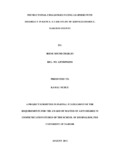| dc.identifier.citation | Charles,Irene Ndumi,August,2011.Instructional Challenges Facing Learners With Disability In Kenya: A Case Study Of Kibwezi District, Makueni County,A Project Submitted In Partial Fulfillment Of The Requirements For The Award Of Master Of Arts Degree In Communication Studies Of The School Of Journalism, The University Of Nairobi. | en_US |
| dc.description.abstract | This study is on the instructional challenges facing learners with disability in Kibwezi
District, Makueni County. It contends that to ensure that learners with disability are
not denied access to education because of their disability, there is need for a
conducive environment that takes care of the instructional needs for all learners,
including those with disabilities.
The objectives of the study included exammmg the attitude of teachers towards
broadening the right to education by LWDs, assessing the appropriateness of the
curriculum and other resources in use for learners with disability in enhancing their
educational needs, finding out the attitude of the LWDs towards education, finding
out the socio-economic and cultural factors that influence the realization of the right
to education by LWDs, and establishing the influence of government policy through
the Ministry of Education on education for LWDs.
The study will provide information and data regarding the current situation on the
educational instructional challenges facing LWDs. It will provide useful guidelines on
policy matters relating to LWDs and serve as a source from which future development
of the curriculum can be based. Furthermore, the Quality Assurance and Standard
Officers (QASO) may use the findings to enforce teaching and learning of LWDs; this
will also aid in in-service training courses and workshops for teachers handling the
subject.
This is a case study, employing survey methods. It was aimed at getting familiarity
and new insights into teachers' attitude towards inclusive education for LWDs in
Kenya. Kibwezi district has been selected as the study site. It is deemed suitable for
this study because it is a typical representative of a rural district in Kenya with many
school-going children with disability challenges.
The study used non-probability sampling design to sample a total of 90 respondents.
The study reached an estimate of 50 teachers in the public schools from the district
that have LWDs, 3 program staff from AMREF CBR programme, 4 senior education
officers and 3 officials of the persons with disability organization, 30 pupils, with and
without disability. Interview schedules were the major tools of data collection. The
interview guides were administered by the researcher and research assistants. They
were appropriate for the study because they allowed for clarifications when the study
was ongoing. The data for the study was then analyzed qualitatively. The researcher
sorted out the collected data for themes and patterns based on the research questions
and presented the relationships. The findings were then presented in narrative form.
The study concluded that there is need for the government to post more special
education needs teachers, and build classes that match the needs of the learners based
on their nature of disability. | en_US |

